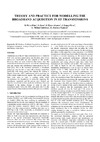Please use this identifier to cite or link to this item:
https://accedacris.ulpgc.es/jspui/handle/10553/42960
| Title: | Theory and practice for modelling the broadband acquisition in HF transmissions | Authors: | Pérez Díaz, Baltasar Zazo, S. Pérez-Álvarez, I. López-Pérez, J. Melián Gutiérrez, L. Jiménez-Yguácel, E. |
UNESCO Clasification: | 3307 Tecnología electrónica | Issue Date: | 2012 | Journal: | IET Conference Publications | Conference: | 12th IET International Conference on Ionospheric Radio Systems and Techniques, IRST 2012 | Abstract: | Traditional use of the HF band is limited mostly to 3 KHz for both voice and data transmission, and therefore, most of the transceivers bandwidths are also adapted to this profile. However, there are some initiatives that clearly state that much broader bandwidths may be use with the corresponding data rate increase and performance improvement in the HF band [1,5]. Due to the increased bandwidth, a broadband transceiver receiver has to cope with a broader acquisition bandwidth with strong signals that degrade the Analog to Digital Converter (ADC) performance while receiving our (often) much weaker desired signals. This current paper has three main steps in order to evaluate under which circumstances the degradation is noticeable regarding the interchannel separation and the powers ratio. Indeed, our objective is to determine how much the interference has to be mitigated in the analog domain in order to split its cancellation partly before the ADC, and partly after it in the digital domain where much powerful techniques are available. | URI: | https://accedacris.ulpgc.es/handle/10553/42960 | ISBN: | 9781849196239 | DOI: | 10.1049/cp.2012.0401 | Source: | IET Conference Publications,v. 2012 |
| Appears in Collections: | Actas de congresos |
SCOPUSTM
Citations
2
checked on Jun 8, 2025
Page view(s)
282
checked on Jan 15, 2026
Download(s)
230
checked on Jan 15, 2026
Google ScholarTM
Check
Altmetric
Share
Export metadata
Items in accedaCRIS are protected by copyright, with all rights reserved, unless otherwise indicated.
